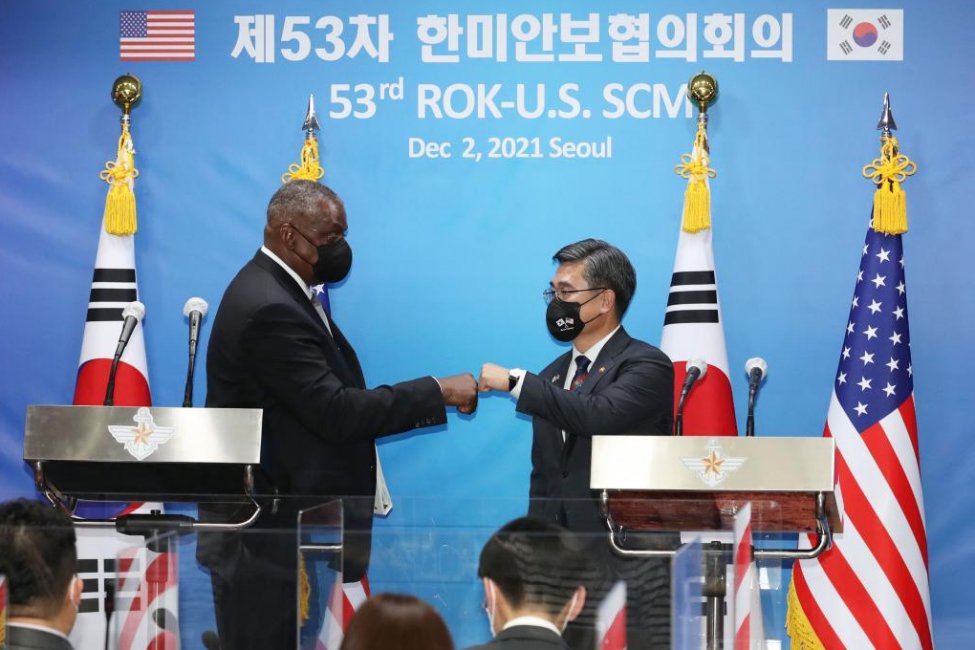U.S. Defense Secretary Lloyd Austin and South Korean Defense Minister Suh Wook meet Thursday for an annual defense meeting and announced that the allies are developing a new war strategy in the face of a growing threat from North Korea. Photo by Yonhap
SEOUL, Dec. 2 (UPI) — The United States and South Korea will update their military strategic playbook for the first time in a decade in response to growing threats from North Korea, the defense chiefs of both countries announced at a meeting in Seoul Thursday.
U.S. Defense Secretary Lloyd Austin and South Korean counterpart Suh Wook agreed on new strategic planning guidance, which will be used to revise joint wartime operations plans, during an annual summit between the allies.
“We reaffirmed our shared assessment that the DPRK is continuing to advance its missile and weapons programs, which is increasingly destabilizing for regional security,” Austin said at a press briefing after the meeting. The Democratic People’s Republic of Korea is the official name of North Korea.
The two allies “remain committed to a diplomatic approach to the DPRK and we continue to call upon the DPRK to engage in dialogue,” Austin said. “But we also discussed measures to enhance our combined deterrence posture and to defend against the full range of threats.”
North Korea showed off a slew of new weapons in September and October, including long-range cruise missiles, a submarine-launched ballistic missile and what Pyongyang claimed was a hypersonic weapon. The secretive state has also substantially developed its nuclear weapons capabilities since the existing strategic guidance was drawn up over ten years ago, precipitating the need for an update.
“While the [strategic planning guidance] signed in 2010 is still in effect, there have been changes to the threats that we face as well as changes to our military organization and combined defense structure,” Suh said at the press briefing.
The South Korean defense minister also confirmed that U.S. military presence on the Korean peninsula would remain at its current level of roughly 28,500 troops.
In a joint communique issued Thursday, the United States committed to providing extended deterrence to South Korea, “utilizing the full range of U.S. defense capabilities, including nuclear, conventional and missile defense capabilities.”
Both sides also discussed South Korea’s increasing role as a regional security partner, particularly as the United States has been looking to enlist support among allies to counter an increasingly assertive China.
The communique acknowledged “the importance of preserving peace and stability in the Taiwan Strait,” echoing language first used in a May joint statement by South Korean President Moon Jae-in and U.S. President Joe Biden.
China considers Taiwan a breakaway province and has vowed to retake it by force if necessary. In recent months, Beijing has significantly ratcheted up its military pressure, sending aircraft into Taiwanese airspace on a regular basis and practicing beach landing drills in a nearby province.
On Thursday, Austin criticized China’s development of hypersonic weapons, saying that it “increases tensions in the region.”
“We have concerns about the military capabilities that the PRC continues to pursue,” he said. The People’s Republic of China is the country’s official name.
“It just underscores why we consider the PRC to be our pacing challenge,” he said. “We’ll continue to maintain the capabilities to defend and deter against a range of potential threats from the PRC to ourselves and to our allies.”
The China issue remains a thorny one for South Korea, however, which has to weigh its economic relationship with its number one trading partner. On Thursday, Suh said that Seoul’s role in regional security had not yet been defined.
Also on the agenda at the annual defense summit, known as the Security Consultative Meeting, was a discussion of the transfer of wartime operational control of allied troops from Washington to Seoul. Moon had made completing the transfer a key goal of his single term, which ends in May, but the COVID-19 pandemic interrupted the process.
The defense chiefs said Thursday that progress had been made on meeting conditions for the transfer and that both sides had agreed to conduct a full operational capability assessment next year.
Austin was joined on his trip to Seoul by senior U.S. military commanders, including Joint Chiefs Chairman Gen. Mark Milley, who met with his counterpart, Gen. Won In-Choul, on Wednesday. The annual talks were the first held since Biden took office in January.
